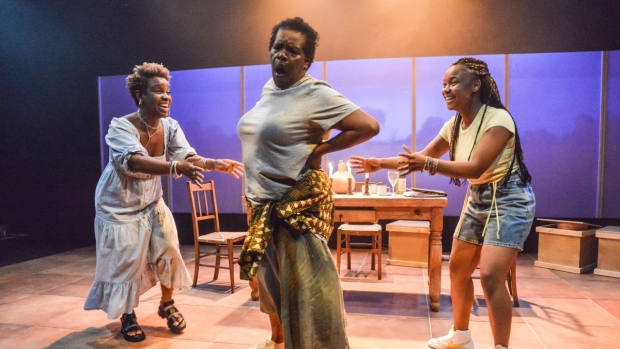Malindadzimu at the Hampstead Theatre – review

© Robert Day
This topical new play from Mufaro Makubika proves a bit of a curate's egg. On one hand its central narrative, of a British Zimbabwean single mother and her relationship with her teenage daughter as they travel back to their ancestral land, is gripping and acutely well observed. But the spiritual experiences that give the play its political message feel rather overwrought.
The play opens with 15 year-old Hope in a hospital room, where she has been admitted for a suspected overdose. Her anxieties are in many ways familiar, though when she mentions she's been "seeing things" there are hints of something else. After her mother Faith, who was a Rhodes scholar and has become a British citizen, decides they will return to their family farm in Zimbabwe, these visions become all the more intense.
Hope begins to interact with one of her ancestors, who entreats her to excavate the corpse of the aforementioned Victorian empire-builder and "finish our war" by banishing him from the country once and for all. The title of the play is the name given to this sacred burial land, which Rhodes himself dubbed "a view of the world".
The struggle of both Hope and Faith, superbly played by Kudzai Mangombe and Shyko Amos, to come to terms with the legacy of colonialism in Zimbabwe and also their own British identity, is the heart of the play and the interactions between them fizz with this underlying cultural divide. There is humour too, particularly through the larger-than-life character of the family's Zimbabwean helper Gogo (another excellent performance from Natasha Williams), who teaches Hope to make peanut butter while learning about social media – or "the 'gram" – in return.
Monique Touko makes an assured directing debut in a production that feels elongated but never dull, played out on Zoë Hurwitz's economic yet vibrant set. And Sifiso Mazibuko and Tendai Humphrey Sitima show great versatility by bringing to life a range of supporting characters – this is an ensemble firing on all cylinders.
As the Rhodes Must Fall protests continue and Britain continues to wrestle with its post-colonial identity, Makubika is writing in decidedly 'hot button' territory. But by anchoring it in the story of a mother-daughter relationship he avoids the pitfalls of agitprop and tells a story with universal relevance. However, the theatrics of the spiritual visions are difficult to rectify with the subtlety of the central drama, and the conclusion feels rather neat and predictable considering the tensions that build up to it.










